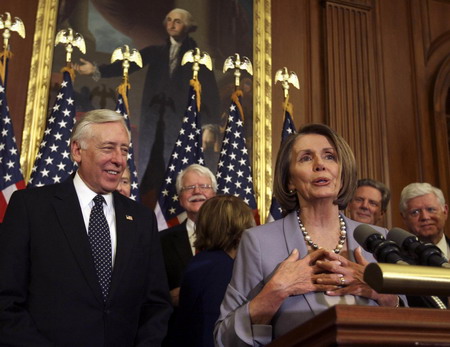Asia-Pacific
US Congress passes historic health care bill
(Agencies)
Updated: 2010-03-22 14:32
 |
Large Medium Small |
A shouting band of protesters outside the Capitol dramatized their opposition, and one man stood up in the House visitor's gallery shouting, "Kill the bill" before he was ushered out -- evidence of the passions the yearlong debate over health care has stirred.
Obama lobbied by phone from the White House, then took the crucial step of issuing an executive order that satisfied a small group of Democrats who demanded that no federal funds be used for elective abortions.
Over and over, Democrats stressed the historic nature of the day. The measure represents the biggest expansion of the social safety net since Medicare and Medicaid were enacted in 1965 during President Lyndon B. Johnson's administration to provide government-funded health care coverage to the elderly and poor.
"Health care isn't only a civil right, it's a moral issue," said Democratic Rep. Patrick Kennedy. He said his late father, Sen. Edward M. Kennedy, had worked his entire career for nationwide health care, and President John F. Kennedy before him.
Obama has said often that presidents of both parties have tried without success to achieve national health insurance, beginning with Theodore Roosevelt early in the 20th century.
The 44th president's quest to succeed where others have failed seemed at a dead end two months ago, when Republicans won a special election to fill Edward Kennedy's Massachusetts Senate seat, and with it, enough votes to prevent a final vote.
But the White House, Pelosi and Senate Majority Leader Reid soon came up with a rescue plan that required the House to approve the Senate-passed measure despite opposition to many of its provisions, then have both chambers pass a fix-it measure incorporating numerous changes.
The second, smaller meacoverage to uninsured people with medical problems until 2014, when the coverage expansion goes into high gear.
Once enacted, the two bills would create a series of so-called "insurance exchanges" beginning in 2014 where self-employed people and small businesses could pool together to shop for health care coverage.
To pay for the changes, the legislation includes more than $400 billion in higher taxes over a decade, roughly half of it from a new Medicare payroll tax on individuals with incomes over $200,000 and couples over $250,000.
|
 House Democratic leaders celebrate healthcare bill passage after vote on Capitol Hill in Washington, March 22, 2010. [Agencies] |






